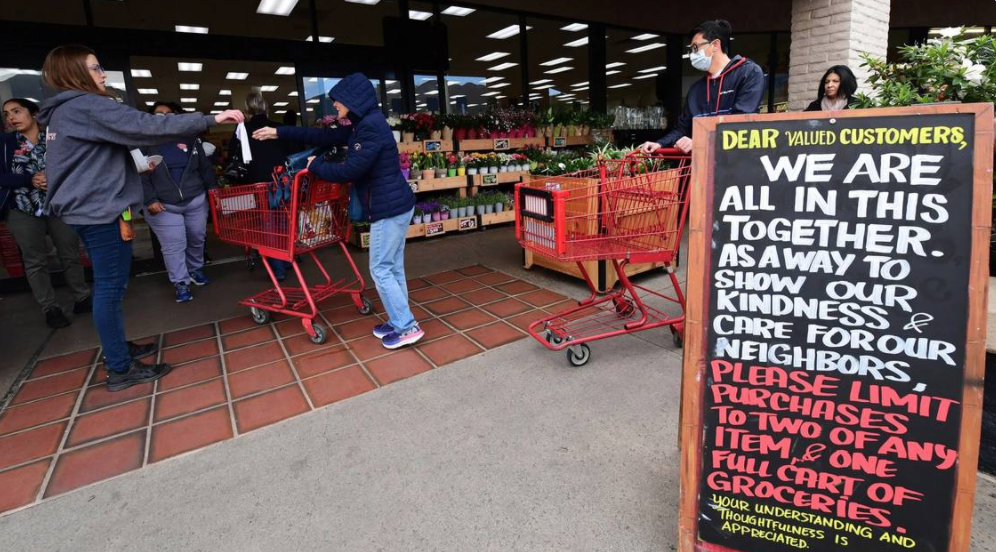Physicians, economists and politicians are filling the airwaves with their views about the COVID-19 pandemic. I decided to call a well-known social psychologist to ask how this crisis will change the world. What he said was surprisingly optimistic amid so much doom and gloom.
Professor Peter Coleman, a Columbia University professor of psychology who studies political conflicts and natural disasters around the world, says the coronavirus crisis may lead to a decline in political polarization in the United States and beyond.
Coleman, who is about to publish a new book entitled “The Way Out: How to Overcome Toxic Polarization,” says several studies have shown that “common enemies” like the coronavirus have helped deeply divided societies come together in the past.
The same could happen in the United States, and in European and Latin American countries where political polarization has risen dramatically in recent years, he said.
Coleman cited the case of the 56-day Nazi bombing campaign against the Britain, which Prime Minister Winston Churchill’s cabinet thought would drive people to turn against each other for scarce resources. Instead, it created a rise in altruism, compassion, generosity and actions for the common good.
Something similar happened after the 2004 tsunami in Indonesia. Ethnic groups that were fighting each other, the government and insurgents put their differences aside and helped communities rebuild, he said.
The second reason why Coleman is cautiously optimistic about a decline in polarization is that natural catastrophes have often acted as “shocks to the political system.” Over a period of years, they resulted in major political changes.
A study of 850 inter-state conflicts that took place between 1816 to 1992 found that more than 75 percent of them ended within 10 years of a major destabilizing shock, he said.
Another study by Princeton University political scientist Professor Nolan McCarty showed that the United States had a deeply polarized political system in the late 19th and early 20th centuries, but saw a significant rise in political cooperation after 1924. That was a decade after World War I and after the 1918 flu pandemic that killed 50 million worldwide.
“The point is that these kinds of shock, like the current pandemic, is not a guarantee of any type of change, but it is oftentimes a necessary condition to change deeply entrenched patterns like political polarization around the world,” Coleman told me.
Sure enough, we are already seeing some examples of this nowadays. In Colombia, the National Liberation Army (ELN) guerrilla group recently declared a one-month cease-fire in its insurgency as a “humanitarian gesture.” In Argentina, President Alberto Fernandez and Buenos Aires mayor Horacio Rodriguez Larreta, bitter political rivals, have met to jointly fight the pandemic in the country’s capital.
But there are also reasons to be skeptical about overly optimistic scenarios. Nationalism and populism were already on the rise before the COVID-19 crisis, as we’ve seen with the election of President Trump, Boris Johnson in Britain and Jair Bolsonaro in Brazil, among others.
And globalism seems to be in trouble. Unlike what happened during the 2001 and 2008 crises, this is the first time in recent memory in which the United States is not leading a coordinated global initiative to fight a global problem.
Trump, a self-described nationalist, has not proposed any major global strategy to fight COVID-19, for which he has blamed China. And China is blaming Trump’s erratic response to the virus — first minimizing its threat, and only recently acknowledging its gravity — for its deadly toll in the United States.
We’re seeing an every-country-for-itself world — far from the solidarity and joint action for the common good that Coleman is talking about.
So far, it’s hard to see this crisis leading to a resurgence of solidarity at the national or global stage in most countries. But the good news is that, if Coleman is right, there is often a delayed effect of about 10 years between the time of big catastrophes and major changes for the better in countries’ behavior.
There’s still hope for a less polarized, more collaborative and better world as a result of this crisis.
Don’t miss the “Oppenheimer Presenta” TV show at 8 p.m. E.T. Sunday on CNN en Español. Twitter: @oppenheimera
Read the Original Publication in the Miami Herald Here
